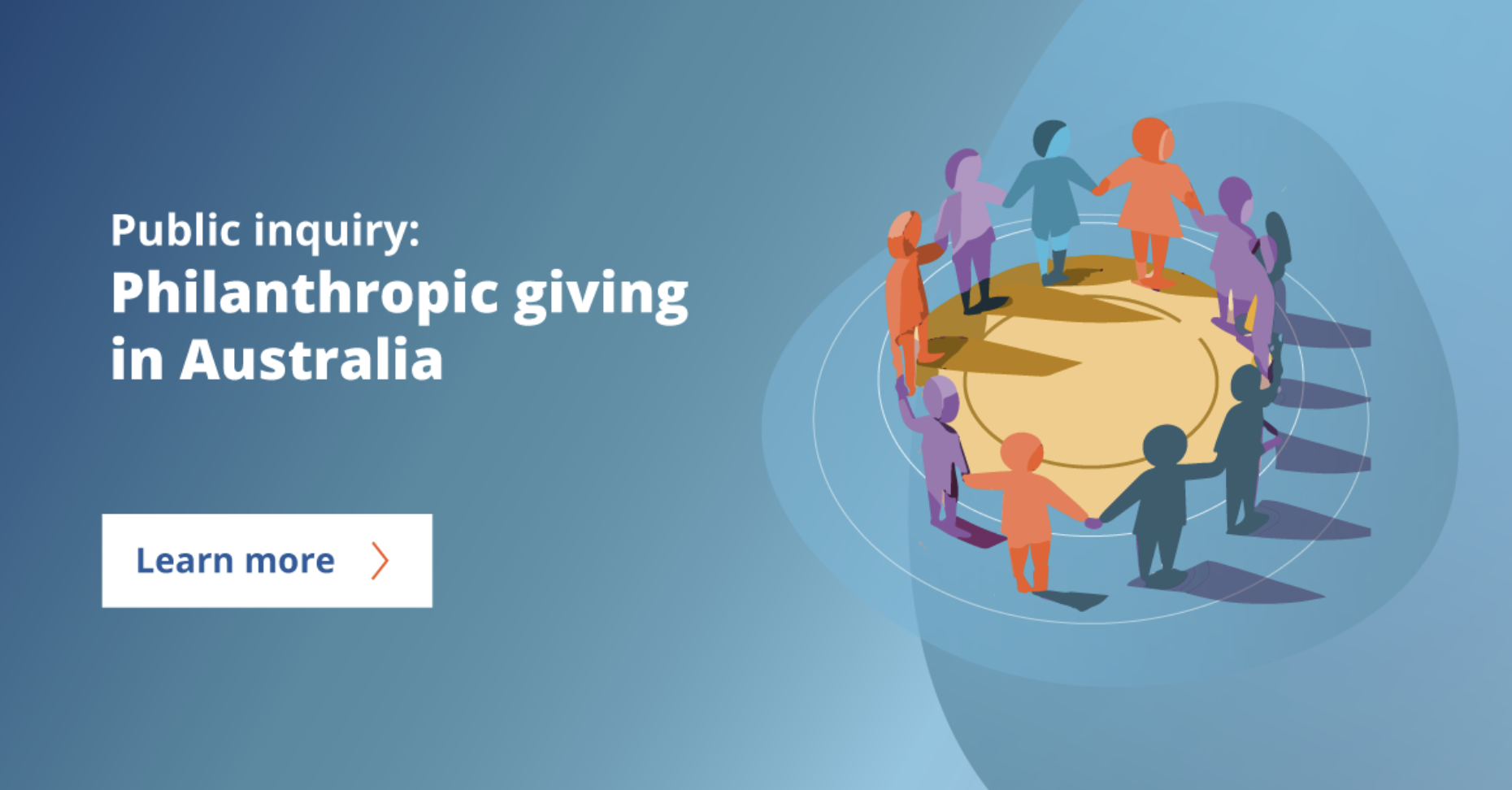GiveOUT’s submission: Productivity Commission’s philanthropy inquiry public hearings
On 13 February 2024, GiveOUT was invited to provide feedback at the Productivity Commission’s philanthropy inquiry public hearings. See below for GiveOUT’s full statement.
GiveOUT emphasised that, while the Government’s goal of doubling philanthropic giving by 2030 is welcomed, it must be done in a way that does not reinforce existing inequalities. Despite the urgent need for LGBTIQ+ led solutions to the systemic challenges facing our communities, our sector receives only 5 cents to every $100 philanthropic dollars. We need to ensure the proposed reforms (such as the overhaul of the DGR system) enable more equitable access to, and distribution of, funding.
A well-resourced LGBTIQ+ community sector is vital
LGBTIQ+ communities experience poorer mental and physical health, increased rates of homelessness and isolation, and social and economic marginalisation. If we are to tackle the ongoing challenges and barriers that vulnerable members of the LGBTIQ+ community in Australia still face, we must adequately resource and increase the capacity of the LGBTIQ+ organisations best placed to support them.
Significant evidence from Australia and internationally, both generally and from the response to the HIV-AIDS epidemic specially, highlight that there is no substitute for LGBITQ+ led services. There are two key reasons for this:
LGBTIQ+ populations are diverse and require tailored responses to address specific needs; and
Many mainstream service providers (including faith-based service providers) are not safe and inclusive for LGBTIQ+ people - both historically and currently.
Doubling giving under the status quo will reinforce existing inequalities
The current philanthropic landscape does not provide equitable access to, and distribution of, funding. While over 10% of Australians identify as LGBITQ+, and our communities are over-represented across many areas of disadvantage, our communities receive only 5 cents to every $100 philanthropic dollars. Only 0.2% of all registered charities list LGBTIQ+ people as the main beneficiary group that they serve, and more than 50% of LGBTIQ+ charities are unable to meet demand for services. Despite the high demand for services and proven effectiveness of the LGBTIQ+ community sector, the LGBTIQ+ community sector is young and small, chronically underfunded, and unable to meet demand.
Doubling philanthropic giving in the same manner will only reinforce existing dynamics and disparities. We encourage the Commission to further examine the structures that determine what issues and population groups get funded. We need to ensure that increased giving is not channeled in the same way and to the same places it currently is. For example, issues such as medical research and the arts have historically been a major focus of philanthropy, compared to certain population groups such as LGBTIQ+ communities and refugees, and issues such as climate change.
We support the proposed overhaul of the DGR system
The current DGR system is complex, inconsistent and unfair, particularly for certain marginalised and politicised populations such as LGBITQ+ communities. As identified in GiveOUT and The Aurora Group’s ‘Where are the Rainbow Resources Report’, the vast majority of LGBTIQ+ charities do not have DGR-1 status, providing significant barriers to attracting funding and meeting community needs. Noting the Commission’s finding that a tax deduction is one of the most effective ways to incentivise giving, GiveOUT strongly supports the recommended changes to overhaul the DGR system to enable greater access.
We agree with the finding in the draft report that smaller charities, charities that support groups of people (including LGBTQIA+ people), and charities focused on advocacy and prevention are often ineligible for DGR status. With limited DGR-1 across the LGBTIQ+ space, we cannot contribute actively in growing the donor dollar and ultimately we cannot improve the life outcomes for over 10% of the Australian population. If the purpose of growing giving is about creating healthier communities, then this is an issue that needs addressing.
In regards to the second principle proposed by the Commission around the comparative value of the government’s investment in philanthropic funding: LGBTIQ+ communities, along with many other sectors, benefit greatly from philanthropic funding due to its flexibility and risk tolerance for grassroots organisation. The government benefits as a well-resourced LGBITQ+ community sector is best placed to address the disproportionate health and economic needs of LGBTIQ+ populations, posing less pressure on government services.
Community infrastructure is critical to democratise decision-making
Community funders (like GiveOUT, Aurora and Pride Foundation for the LGBITQ+ community) play a critical role in the ecosystem by entrusting decision-making in the hands of impacted communities who are best placed to understand the nuances in community need and where funding is required, leading to better outcomes. To democratise decision-making and shape a more equitable redistribution of wealth, we support investment in community-led infrastructure and accessible giving models (e.g. giving circles, crowdfunding, digital fundraising).
We also support other recommendations that particularly benefit small organisations, including streamlining fundraising licences, funding for core and capacity building and increasing volunteer participation.
We encourage LGBTIQ+ organisations to consider making a submission to the Commission via https://www.pc.gov.au/inquiries/current/philanthropy#report. The final report will be due to the Government on the 11 May 2024.
Sources: ‘Where are the Rainbow Resources Report?’ by GiveOUT and Aurora

